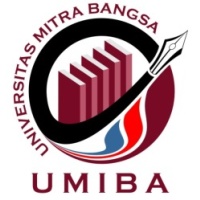MODEL SISTEM PENDIDIKAN PONDOK PESANTREN MODERNALUMANAATERINTEGRITAS PADA PEMBERDAYAAN SUMBER DAYAALAM DALAM MENCAPAI PRESTASI AKADEMIS DAN NON AKADEMIS
Abstract
Empowerment of Natural Resources in the education environment provides positive values for the environment and provides its own economic contribution for institution. Environmental factors also have added value for students in carrying out the teaching and learning process so that researchers will find out whether the education model by integrating on empowering aspects of natural resources will provide creativity to students and also how integrated education patterns in natural resource empowerment aspects will produce results of academic and non-academic achievements. In addition, the results of this study can provide inspiration for prospective educators to find out about education models that integrate into Natural Resources at school locations and for education can be used as role models of education in the future. Therefore researchers will conduct research with a qualitative research method approach. The use of data collection tools in the form of interview guide sheets, observation sheets, documentation, and questionnaires. The interview model is carried out with open and structured interview techniques. Interview guides that have been arranged, but if there are questions that are developing but are still relevant to aspects of the research will be adjusted to the answers of the subjects or respondents. The distribution of questiionnairs about students’s satisfaction with the results of the antpes education that show more than 70% of them are happy and motivated to learn many things and obey the rules tht have been announced . This natural resource which is one of the sources of income in Modern Islamic Boarding School teaches the students the balance of life and is implemented with daily activities that are always guided by making very significant result in the academic achievement and the non academic achievement .
Full Text:
PDFReferences
Husnul Bahri. Pengelolaan Pendidikandan Pembelajaran Berbasis Potensi Lokal, Program Pasca Sarjana IAIN Bengkulu. NUANSA Vol. IX, No. 1, Juni 2016 .hal 41
Wahab, Rochidin. Sejarah Pendidikan Islam di Indonesia (Bandung: Alfabeta,CV, 200) hal.153,154
Hielmy, Irfan. Wancana Islam (ciamis:Pusat Informasi Pesantren,2000), hal. 120
Fatah, H Rohadi Abdul, Taufik, M Tata, Bisri, Abdul Mukti. Rekontruksi Pesantren Masa Depan, (Jakarta Utara: PT. Listafariska Putra, 2005), hal.11
HS, Mastuki, El-sha, M. Ishom. Intelektualisme Pesantren, (Jakarta: Diva Pustaka, 2006), hal.1 Haedari, H.Amin. Transformasi Pesantren, (Jakarta:
Media Nusantara, 2007), hal.3 https://id.wikipedia.org/wiki/Pesantren_modern, 3
Oktober 2018, jam 20.35
Majalah Tajdid (ciamis:Lembaga Penelitian dan Pengembangan, 2009), hal. 358
https://moondoggiesmusic.com/sumber-daya-alam/.
Oktober 2018
Sugiyono, 2016; Metode Penelitian Manajemen, hal.347. PenerbitALFABETA. Bandung
Sudijono, Anas. 2006. Pengantar Evaluasi Pendidikan.
Jakarta: Raja Grafindo
Sugiyono, 2015, Metode Penelitian Manajemen, hlm.
Penerbit ALFABETA.Bandung Margono. 2000. Metodologi Penelitian Pendidikan.
Jakarta: Rineka Cipta
Nana Sujana, 2008:68). Metode wawancara. Jakarta Suharsimi Arikunto dalam bukunya prosedur penelitian suatu pendekatan praktek (2006:151) Sugiyono, 2016; Metode Penelitian Manajemen,
hal.347. PenerbitALFABETA. Bandung
DOI: https://doi.org/10.46975/ebp.v3i2.408
Refbacks
- There are currently no refbacks.
Published by:
Universitas Mitra Bangsa
Jl. Tanjung Barat No. 11 Jakarta Selatan
Telp: (021) 7817823 Fax: (021) 7815144
Website: https://umiba.ac.id/



